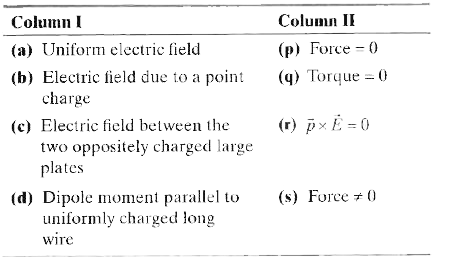When dipole moment →p of a dipole is parallel to electric field intensity →E (stable equilibrium) the potential energy of dipole is
positive, maximum
positve, minimum
negative, maximum
negative, minimum
The correct Answer is:D
Step by step video, text & image solution for When dipole moment vec(p) of a dipole is parallel to electric field intensity vec(E ) (stable equilibrium) the potential energy of dipole is by Physics experts to help you in doubts & scoring excellent marks in Class 12 exams.
Related Playlists
- BOOK - NARAYNACHAPTER - ELECTROSTATIC POTENTIAL AND CAPACITANCEEXERCISE - C.U.Q (Potential due to continuous charge distribution)10videos
ELECTROSTATIC POTENTIAL AND CAPACITANCE
- BOOK - NARAYNACHAPTER - ELECTROSTATIC POTENTIAL AND CAPACITANCEEXERCISE - C.U.Q (Electrostatics of conductors)13videos
ELECTROSTATIC POTENTIAL AND CAPACITANCE
- BOOK - NARAYNACHAPTER - ELECTROSTATIC POTENTIAL AND CAPACITANCEEXERCISE - C.U.Q (Potential energy of system of charges )6videos
ELECTROSTATIC POTENTIAL AND CAPACITANCE
- BOOK - NARAYNACHAPTER - ELECTROMAGNETIC WAVES EXERCISE - EXERCISE -415videos
ELECTROMAGNETIC WAVES
- BOOK - NARAYNACHAPTER - ELECTROSTATICS AND GAUSS LAWEXERCISE - Intergers type question11videos
ELECTROSTATICS AND GAUSS LAW
Similar Practice Problems
- Question 1 - Select One
When dipole moment →P of a dipole is anti parallel to electric field intensity →E (unstable equilibrium), the potential energy of dipole is
Apositive, maximumBpositive, minimumCnegative, maximumDnegative, minimum - Question 1 - Select One
For an electric dipole potential & electric field
Acan have same magnitude for a point at a distance less than 2 meterBcan have same magnitude fo a point at distacnes greater than 2 meterCcan never be equalDcan never be predicted - Question 1 - Select One or More
An electric dipole is placed in uniform electric field. The magnitude of electric dipole moment of dipole is p and external electric field intensity is E. Asume θ is the angle between electric dipole moment and electric field intensity and U represents potential energy of electric dipole
AIf U=0 for θ=0 then for other orientations U=pE(1−cosθ)BIf U=0 for θ=90∘ then for other orientations U=−pEcosθCIf U=0 for θ=180∘ then for other orientations U=−pE(1+cosθ)DAll of the above - Question 1 - Select One
the angle between of the electric dipole moment p and the electric field E when the dipole is in stable equilibrium
A0Bπ/4Cπ/2Dπ - Question 1 - Select One
An electron field of moment p is placed in a uniform electric field E. Then,
(i) the torque on the dipole is p×E
(ii) the potential energy of the system is p.E
(iii) the resultant force on the dipole is zero.A(i),(ii) and (iii) are correctB(i) and (iii) are correct and (ii) is wrongCOnly (i) is correctD(i) and (ii) are correct and (iii) is wrong - Question 1 - Select One
An electric dipole moment p is placed in an electric field of intensity 'E'. The dipole acquires a position such that the axis of the dipole makes an angle θ with the direction of the field. Assuming that the potential energy of the dipole to be zero when θ=90∘, the torque and the potential energy of the dipole will respectively be
ApEcosθ,−pEsinθBpEsinθ,−pEcosθCpEsinθ,−2pEcosθDpEsinθ,2pEcosθ - Question 1 - Select One
An electric dipole moment p is placed in an electric field of intensity 'E'. The dipole acquires a position such that the axis of the dipole makes an angle θ with the direction of the field. Assuming that the potential energy of the dipole to be zero when θ=90∘, the torque and the potential energy of the dipole will respectively be
ApEsinθ,−pEcosθBpEsinθ,−2pEcosθCpEsinθ,2pEcosθDpEcosθ,−pEsinθ
Similar Questions
An electric dipole is placed in an electric field. Column I is the description of electric field and the angle between the dipole moment →p and the electric field intensity →E and Column II gives the effect of the field on the dipole. Then,
 View Solution
View SolutionElectric dipole is placed in external electric field. When the potential energy of dipole is maximum?
View SolutionWhich orientation of an electric dipole in a uniform electric field corresponds to stable equilibrium ?
View Solution

